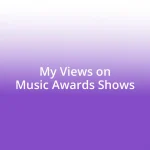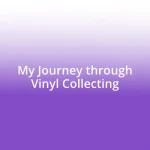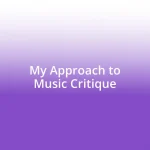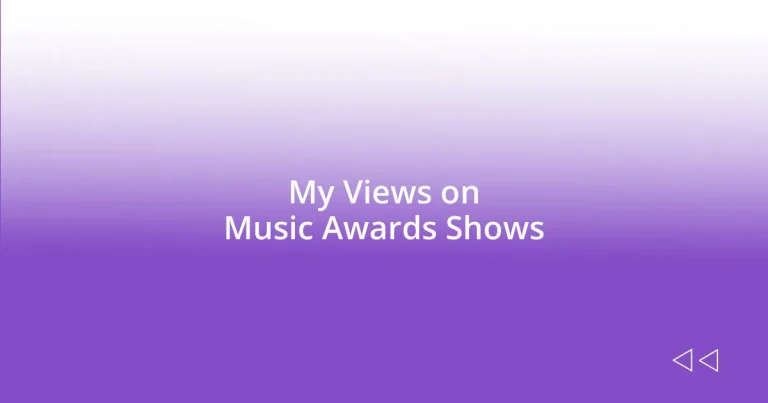Key takeaways:
- Music awards evoke strong emotional connections, reflecting both personal experiences and shared community joy.
- Criticism of awards shows centers on issues like the voting process favoring popularity over talent, lack of diversity, and the overshadowing of artistry by spectacle.
- Fan voting creates excitement but often rewards artists with larger fan bases, challenging the notion of merit-based recognition.
- The future of music awards may see more inclusivity, transparency, and a shift in criteria as digital consumption evolves.
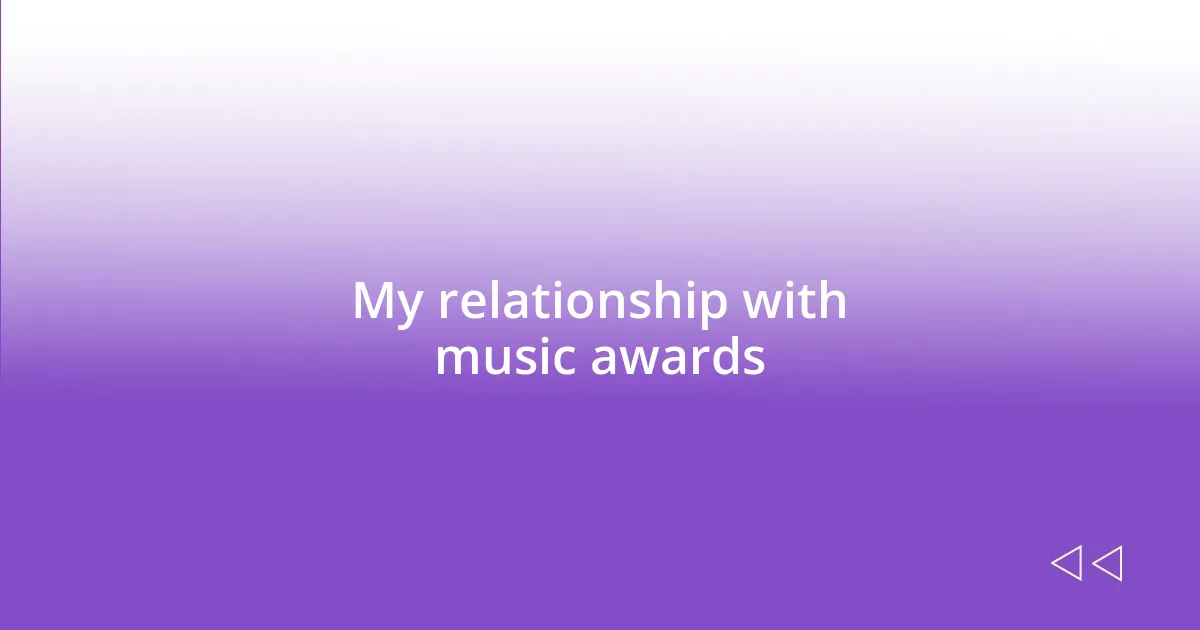
My relationship with music awards
Music awards have always held a special place in my heart. I vividly remember sitting cross-legged on my living room floor as a child, glued to the TV during the Grammy Awards. The excitement in the air was palpable, and I felt a genuine thrill when my favorite artists won—a sense of validation for the music that shaped my childhood.
As I’ve grown older, my perspective on these ceremonies has evolved. At times, I find myself questioning the criteria for winning. Is it about talent, or does popularity play an oversized role? I often reflect on how these awards can influence an artist’s career, bringing both opportunities and pressures. I believe there’s something bittersweet about the glitz and glamour—while celebrating artistry, it can overshadow the true essence of music.
Interestingly, attending a few local music awards made me appreciate the struggles and triumphs of emerging artists. The raw emotions I witnessed, from tears of joy to deep disappointment, created a connection I hadn’t anticipated. How can a few minutes on stage define an entire journey? Each performance and acceptance speech felt like a glimpse into their souls, reminding me that the journey is often just as important as the accolades.
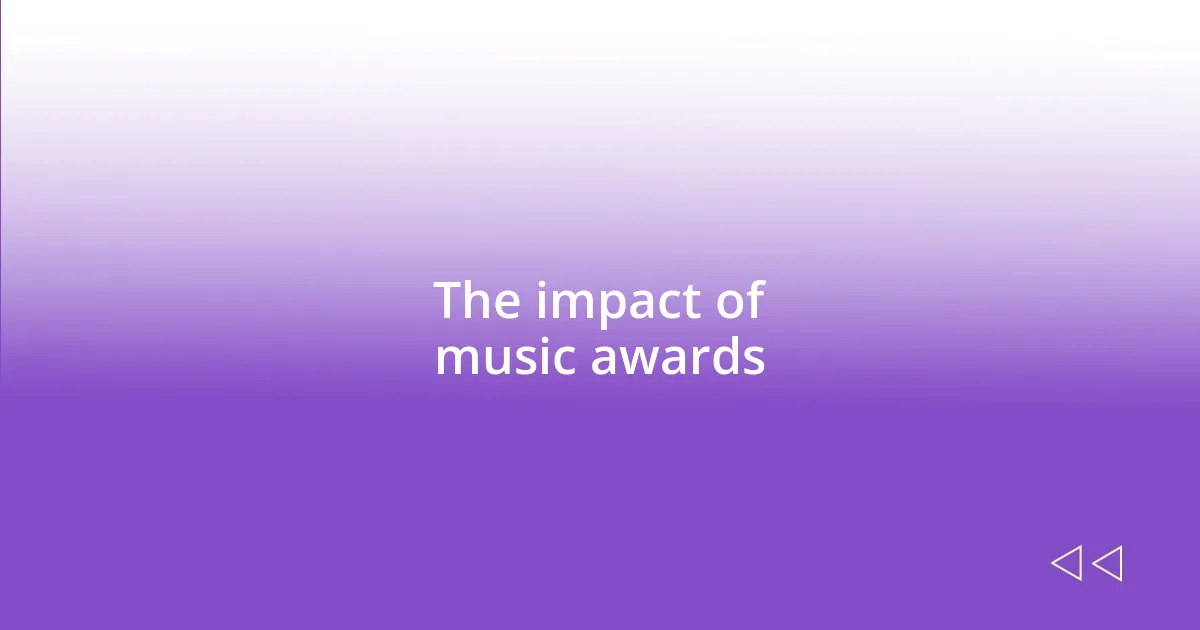
The impact of music awards
The impact of music awards is profound and multifaceted. I’ve observed how winning a prestigious award can catapult an artist from relative obscurity to international fame overnight. This transformation can sometimes be exhilarating, as it validates their hard work and talent. However, it also comes with a heavy price—sudden fame can bring scrutiny, public pressure, and even a loss of creative freedom. I remember seeing a once-rising artist struggle with the expectations that followed a major win. It was heartbreaking to watch them try to balance their artistic vision with what the industry demanded.
- Recognition and Opportunities: Awards often lead to increased collaboration offers and lucrative contracts.
- Public Support: They can strengthen fan bases and deepen connections with audiences.
- Marketability: Winning can enhance an artist’s visibility to brands, leading to endorsement deals and partnership opportunities.
- Mental Health Challenges: The intense pressure can take a toll, sometimes resulting in anxiety or burnout.
- Cultural Significance: Awards reflect societal values and trends, often spotlighting critical issues like diversity and representation in the industry.
Every award ceremony reveals these dualities—while they celebrate achievements, they also raise questions about the nature of success in the music world. It’s a fascinating dance between recognition and the reality of an artist’s journey.
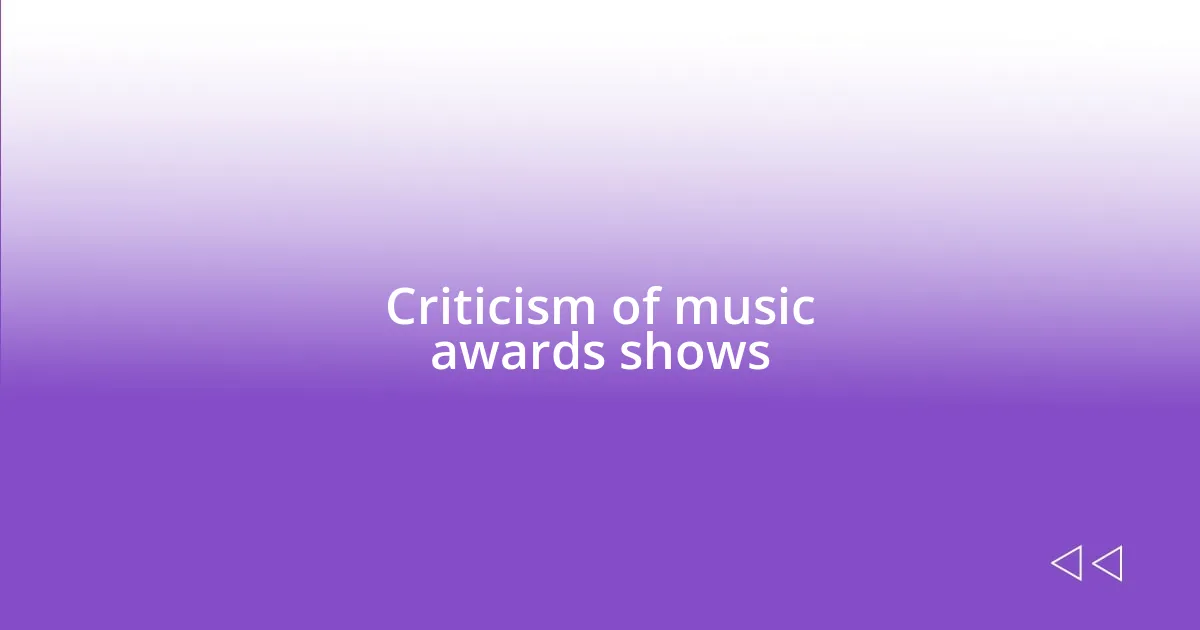
Criticism of music awards shows
There are several ongoing criticisms of music awards shows that often leave me contemplating their role in the industry. For instance, I frequently hear artists expressing frustration over the voting process. It sometimes feels like a popularity contest rather than a fair representation of talent. I remember hearing a seasoned artist mention how their groundbreaking album was overlooked while a more mainstream hit was celebrated. This dichotomy sparks debates about authenticity in music, and I can’t help but wonder if we’re prioritizing commercial success over creative innovation.
Another significant point of contention is the lack of diversity in nominations and winners. Many believe that the same artists often receive accolades, sidelining deserving talents from various backgrounds. I recall the backlash during one awards season when a predominantly white nominee list overshadowed incredible contributions from artists of color. This incident resonated deeply with me, highlighting the industry’s need for broader representation. It left me thinking—how can we celebrate music as a universal language if certain voices are continually silenced?
Lastly, the spectacle of these events can overshadow the artistry itself. Instead of celebrating the music, there’s a heavy focus on image and performance glamour. I once watched an awards show where the red carpet was more talked about than the actual performances. This led me to question whether these events elevate the music or simply create an illusion of success. It can be disheartening when the pressures of appearance take precedence over the musical stories waiting to be told.
| Criticism | Example |
|---|---|
| Popularity Contest | Artists’ frustrations over voting processes favoring mainstream hits |
| Lack of Diversity | Predominantly white nominee lists missing out on artists of color |
| Focus on Image | Red carpet glamour overshadowing musical performances |
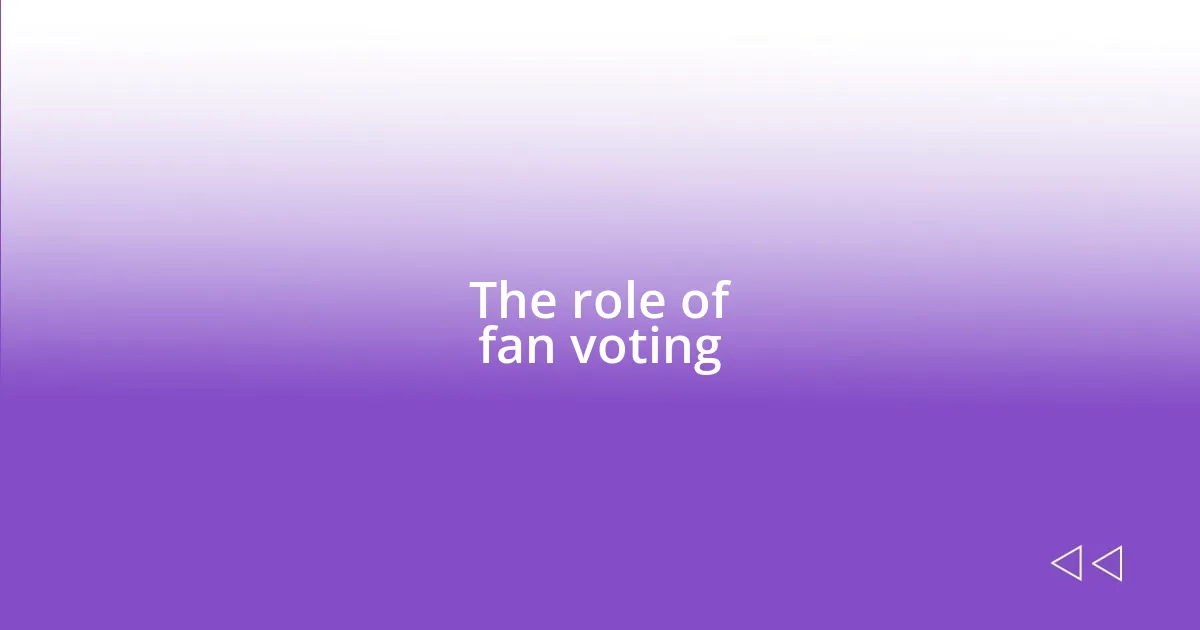
The role of fan voting
When it comes to fan voting in music awards, I’ve seen it create both excitement and frustration. I remember participating in a fan poll for one of my favorite artists, eagerly refreshing the results each day. It felt thrilling to think my vote could help propel them to a win. However, the reality is that this voting system can often favor those with the largest fan bases, making me question whether it’s really a reflection of merit or just a popularity contest.
What complicates things further is the emotional weight fans attach to these outcomes. For many, their chosen artists represent personal stories and experiences, and losing out on an award can feel like a personal defeat. I once spoke with a friend who was devasted when an underdog who had amassed passionate support didn’t clinch the win. Her raw disappointment opened my eyes to how deeply intertwined these awards are with identity and community. It makes me wonder: Shouldn’t every vote count beyond just the loudest voices?
Ultimately, fan voting becomes a double-edged sword. It connects fans to their favorite artists, fostering a sense of belonging. Yet, with this connection comes the disheartening reality that sheer fan numbers often overshadow artistic merit. I’ve seen emerging talent get sidelined, unable to compete against big-name acts because the system doesn’t always reward creativity equally. So, I find myself pondering—how do we strike the right balance between fan engagement and true artistic recognition?
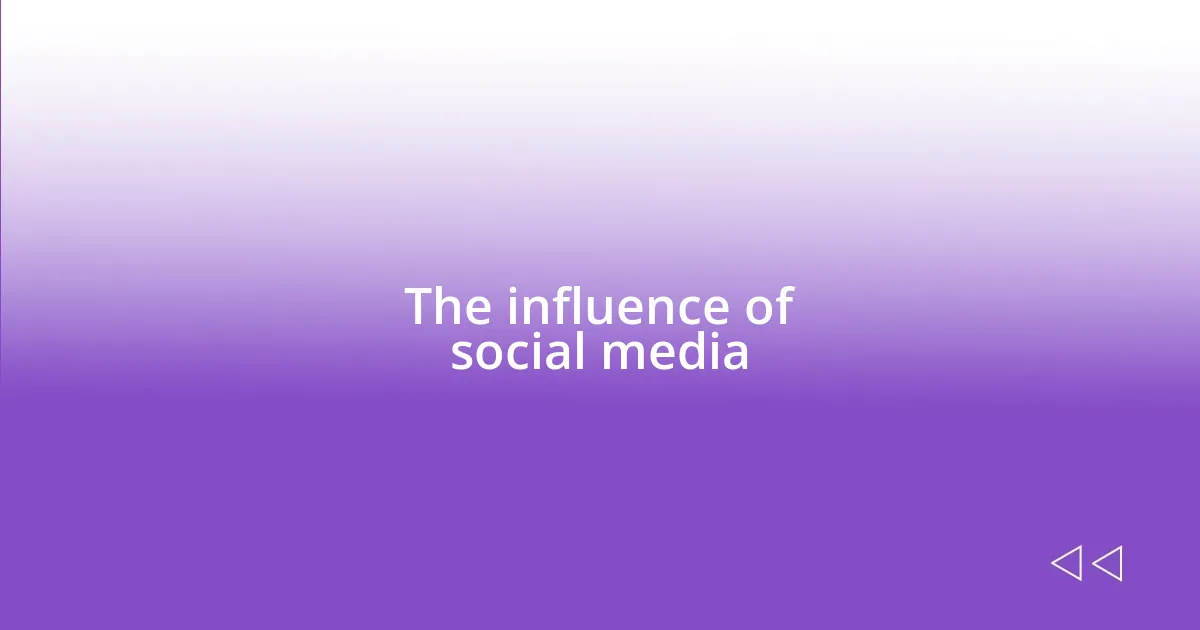
The influence of social media
The impact of social media on music awards shows can’t be underestimated. I often find myself scrolling through Twitter or Instagram, witnessing real-time reactions to nominations and winners. It’s fascinating how hashtags can rally fans and create buzz around certain artists, sometimes even leading to online campaigns to secure votes. This instant feedback loop amplifies the excitement and frenzy, but it also raises the question: are we allowing trends on platforms to dictate the value of quality music?
I remember watching an awards show where an artist I had been rooting for was announced as a winner, and the online celebration was electric. Fans flooded social media with joy, sharing their own stories about how the artist’s music touched their lives. This sense of community is profound, establishing a connection that extends beyond the award itself. Yet, I can’t help but wonder how fleeting such moments can be—does the outrage or joy expressed online translate into lasting recognition for those artists, or is it just a momentary spike in popularity?
Social media also brings more challenges to the table. I’ve seen countless debates erupt over what constitutes merit—especially when a particular artist, who might not have the most traditional or critically acclaimed sound, garners immense social media support. It makes me think: can we genuinely appreciate artistry when the noise of online fandom often drowns out meaningful discussion? Balancing the excitement brought by social platforms with the artistic value deserves our attention, urging a deeper reflection on what these awards truly represent in the digital age.
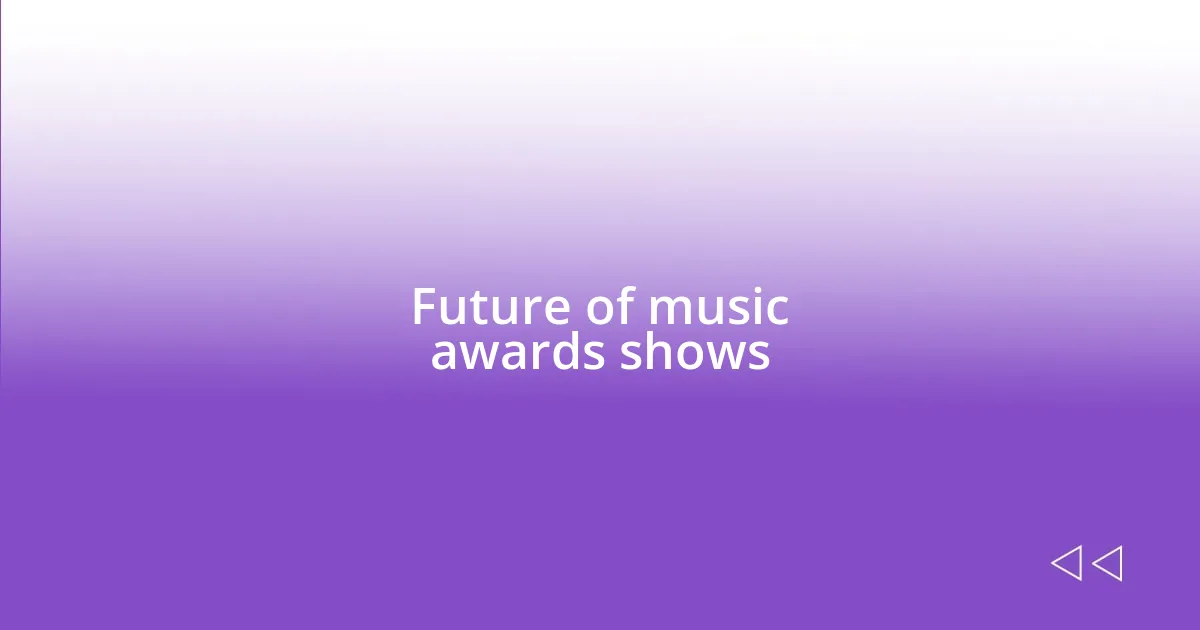
Future of music awards shows
The future of music awards shows seems poised for transformation. One trend I’m noticing is the rise of virtual and hybrid ceremonies, which allow audiences from all corners of the globe to participate. I attended an online event last year where viewers could interact in real time through live chats. That experience made me think: how much more inclusive can we make these events for fans who might not be able to attend in person?
Additionally, I believe that as music consumption evolves, so too will the criteria for awards. With platforms like Spotify and Apple Music favoring streaming numbers over traditional album sales, there’s a conversation brewing about whether we need to reconsider what constitutes recognition in the industry. For instance, I’ve often felt a disconnect when a favorite artist releases a deeply artistic album but doesn’t gain the same appreciation as those with catchy singles. How can we celebrate true creativity in an age dominated by the “hit” mentality?
I also sense a growing desire for transparency in the judging processes. As I’ve engaged in discussions about these awards, many fans express confusion over how decisions are made. I recall a chat with a fellow music lover who passionately questioned why some artists consistently receive nominations while others rarely do, despite having proven talent. This dialogue invites us to reflect: will the future of music awards be defined by inclusivity, creativity, and genuine recognition? If that’s the case, there’s much work ahead to create an awards culture that celebrates all dimensions of artistry.
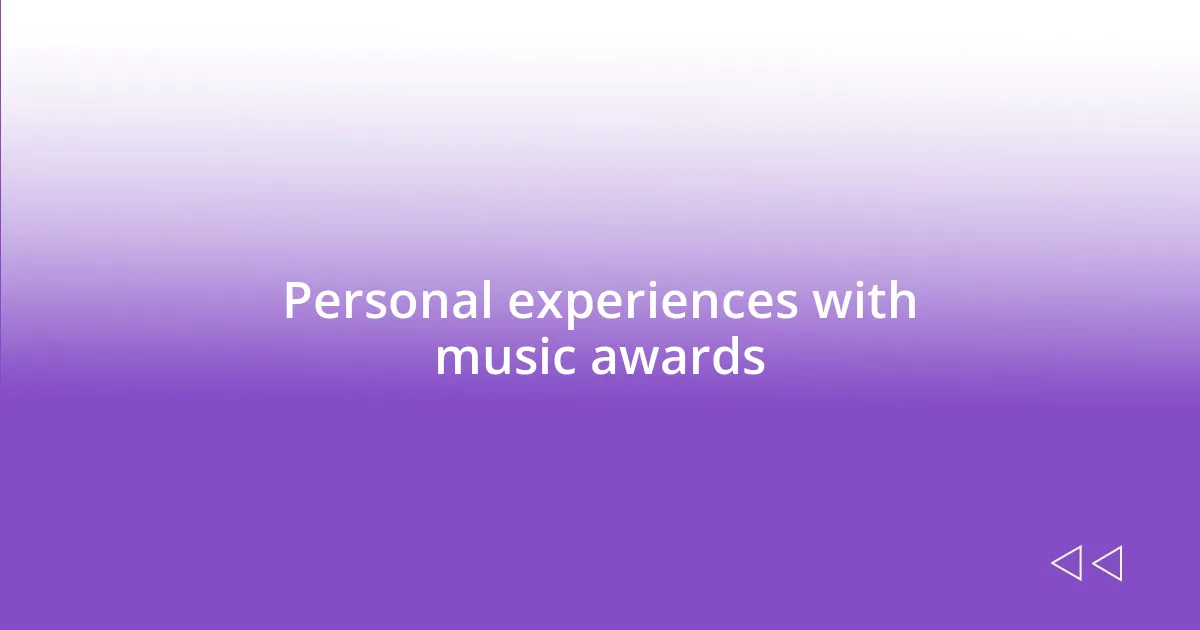
Personal experiences with music awards
Reflecting on my own experiences with music awards, I vividly remember the thrill of watching the Grammy Awards as a child, my heart racing during the Best New Artist category. When the winner was announced, I felt as if I had a personal stake in the outcome, cheering as if they were a friend. It struck me how these moments could forge emotional connections—creating shared joy or disappointment that pulses through our collective music-loving community.
Just last year, I found myself at a local viewing party for a music award show, surrounded by friends and fellow fans. The atmosphere was electric, filled with laughter and spirited debates about who deserved to win. As we munched on snacks, one friend passionately argued for an underdog artist, conveying how their music resonated deeply during tough times. I marveled at how awards shows can spark such profound conversations, making us reflect: do we truly celebrate artists for their music, or for the narratives we construct around them?
Then there are the awards that feel like snubs to fans. I can recall the collective groans in the room when an heavily streamed mainstream artist took home a coveted trophy while others, with far more artistic depth, were overlooked. It left me pondering whether these awards truly reflect the diversity and creativity within music. How do we reconcile personal preferences with the industry’s often narrow definitions of success? It’s a complex dance that keeps me invested in these conversations, even if it can lead to moments of frustration.



